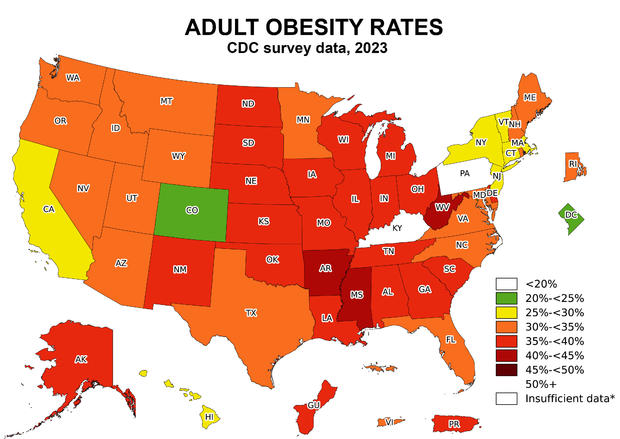For the first time in over a decade, the rising tide of obesity in American adults has come to a halt, according to new data from the Centers for Disease Control and Prevention (CDC). The recent report reveals that approximately 40% of U.S. adults are obese, marking a moment of stability in a trend that has steadily climbed for years.
The CDC’s National Center for Health Statistics shared this data, derived from the long-standing National Health and Nutrition Examination Survey. This extensive health survey has tracked American obesity trends for decades, and while the nation’s obesity rate once sat around 30% in 2000, it has surged to 41.9% by 2020.
Today, the CDC estimates that from 2021 through 2023, the adult obesity rate sits at 40.3%. While the slight drop from the previous figure isn’t statistically significant, it signals a break from the steady increases seen since 2011.
The report notes, “In the United States, the prevalence of obesity in adults remains above the Healthy People 2030 goal of 36.0%,” referring to the federal government’s target to bring down the obesity rate.
Age-Related Obesity Trends Persist

The CDC’s findings show that adults between 40 and 59 years of age have the highest obesity rate at 46.4%, while younger adults, aged 20 to 39, have the lowest rate, at 35.5%. However, severe obesity continues to rise, with the proportion of Americans with a body mass index (BMI) over 40 growing from 7.7% to 9.4%.
This data aligns with warnings from the National Institutes of Health, which underscores the heightened risk of health conditions like diabetes and heart disease among those with a higher BMI.
State-by-State Analysis Paints a Broader Picture
The CDC also recently published its state map of obesity rates based on another ongoing survey, revealing a stark reality: more than one-third of adults in 23 states were obese in 2023. This stands in sharp contrast to 2013 when no states had an obesity rate above 33%. Colorado and the District of Columbia remain outliers, with fewer than 25% of residents considered obese—a notable decrease from the seven states that had similarly low rates in 2013.
“This new data highlight the need for obesity prevention and treatment options, which start with building healthier communities where people of all ages have safe places for physical activity, and where health care and healthy food options are accessible and affordable for all,” emphasized Dr. Karen Hacker, head of the CDC’s National Center for Chronic Disease Prevention and Health Promotion.
Weight-Loss Drug Prices Under Scrutiny as Demand Surges
The release of this data comes just before a Senate committee hearing with Novo Nordisk’s CEO, as lawmakers raise questions about the high cost of the company’s weight-loss medications, Ozempic and Wegovy. With drugs like these from both Novo Nordisk and Eli Lilly in high demand, they have landed on the FDA’s shortage list for years.
“More than 40,000 lives per year could be saved if Wegovy and other weight-loss drugs were made affordable and widely available in the United States,” according to a statement from the Senate Health, Education, Labor, and Pensions committee.
This committee, led by Democrats and Vermont Independent Senator Bernie Sanders, is now pressing for solutions to make these treatments accessible to a broader range of Americans.
As America grapples with the enduring challenges posed by obesity, this latest data offers a glimpse of hope. However, the nation faces an uphill battle to meet its public health goals and ensure access to affordable, effective obesity treatments.



